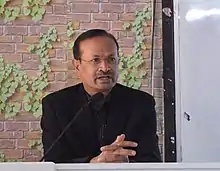Sanjay Kumar | |
|---|---|
 | |
| Director, CSDS | |
| In office 2014–2020 | |
| Succeeded by | Rajeev Bhargava |
| Personal details | |
| Nationality | Indian |
| Residence | New Delhi |
| Education | University of Delhi |
| Profession | Political Analyst and Psephologist |
Sanjay Kumar is an Indian political analyst and psephologist. He served as the director of Centre for the Study of Developing Societies from January 2014 to January 2020.[1] His primarily areas of interest lies are electoral politics, political mobilization, Indian youth and Indian democracy. He has conducted research on a wide range of themes, including state of democracy in South Asia, state of Indian farmers, electoral violence and slums of Delhi.[2][3]
Education
He graduated with B.A in Political Science from Ramjas College, University of Delhi in 1988.[4] He completed his Masters and M. Phil from University of Delhi. He studied survey research at the University of Michigan Survey Research Center.
Career
He succeeded Rajeev Bhargava as Director of Centre for the Study of Developing Societies in 2014. He serves as co-director of Lokniti Programme. He has published widely, written and edited books, contributed chapters for edited volumes and published articles in national and international research journals.[5]
He writes regularly for national and regional newspapers, in English and Hindi. His articles are published regularly in The Hindu,[6] The Indian Express, The Asian Age,[7] Deccan Chronicle,[8] Dainik Bhaskar, Rajasthan Patrika and The Mint.[9][10] He frequently appears on Indian television as a psephologist and political commentator.[11][12] He has also served as an international election observer in many countries.[13]
Publications
Books
- Youth in India: Aspirations, Attitudes, Anxieties Routledge, New Delhi, 2019[14]
- Post Mandal Politics in Bihar: Changing Electoral Patterns, SAGE, New Delhi, 2018[15]
- Electoral Politics in India: Resurgence of the Bharatiya Janata Party (With Suhas Palshikar and Sanjay Lodha) Routledge, New Delhi, 2017[16]
- Changing Electoral Politics in Delhi: From Caste to Class SAGE, New Delhi, 2013[17]
- Measuring Voting Behaviour in India (With Praveen Rai), SAGE, New Delhi, 2013[18]
- Rise of the Plebeians? The Changing Face of Indian Legislative Assemblies (With Christophe Jaffrelot), Routledge, New Delhi, 2009[19]
- Indian Youth in a Transforming World: Attitudes and Perceptions (With Peter R de Souza and Sandeep Shastri), SAGE, New Delhi, 2009[20]
References
- ↑ "Director, CSDS".
- ↑ "Sanjay Kumar".
- ↑ "Sanjay Kumar, Director of the Centre for the Study of Developing Societies". onthinktanks.org. Retrieved 18 September 2019.
- ↑ Measuring Voting Behaviour in India. New Delhi: SAGE. 2013. pp. 4th Page of Preface. ISBN 978-8132110446.
- ↑ "Sanjay Kumar". Economic and Political Weekly. 5 June 2015. Retrieved 18 September 2019.
- ↑ "Sanjay Kumar Profile". The Hindu.
- ↑ "Sanjay Kumar Columnist".
- ↑ "Columnist Sanjay Kumar".
- ↑ "Author Profile".
- ↑ Lokniti, Team. "Sanjay Kumar". Retrieved 18 September 2019.
- ↑ Ashraf, Ajaz. "'People are a little unhappy but not angry with Modi': Psephologist Sanjay Kumar on Lok Sabha polls". Scroll.in. Retrieved 18 September 2019.
- ↑ "The Damned Science of Psephology". Open The Magazine. 15 March 2017. Retrieved 18 September 2019.
- ↑ "Asian Electoral Experts | ANFREL AERC PROJECT". Retrieved 18 September 2019.
- ↑ Kumar, Sanjay (2019). Youth in India: Aspirations, Attitudes, Anxieties. New Delhi: Routledge. ISBN 9780367333881.
- ↑ "Electoral Politics in India, The Resurgence of the Bharatiya Janata Party". Routledge. 2017.
- ↑ "Indian Youth and Electoral Politics: An emerging Engagement".
- ↑ "Changing Electoral Politics in Delhi". SAGE Publications Inc. 28 May 2019. Retrieved 18 September 2019.
- ↑ "Measuring Voter Behavior In India".
- ↑ "Rise of the Plebeians?: The Changing Face of the Indian Legislative Assemblies, 1st Edition (Paperback) - Routledge". Routledge.com. Retrieved 18 September 2019.
- ↑ "Indian Youth in a Transforming World". SAGE Publications Inc. 30 August 2019. Retrieved 18 September 2019.